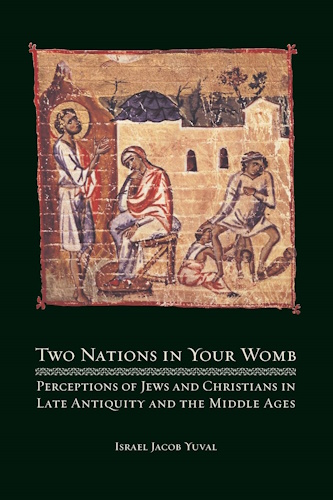

Two Nations in Your Womb: Perceptions of Jews and Christians in Late Antiquity and the Middle Ages

Since it was first published in Hebrew in 2000, this provocative book has been garnering acclaim and stirring controversy for its bold reinterpretation of the relationship between Judaism and Christianity in the Middle Ages, especially in medieval Europe. Looking at a remarkably wide array of source material, Israel Jacob Yuval argues that the inter-religious polemic between Judaism and Christianity served as a substantial component in the mutual formation of each of the two religions. He investigates ancient Jewish Passover rituals; Jewish martyrs in the Rhineland who in 1096 killed their own children; Christian perceptions of those ritual killings; and events of the year 1240, when Jews in northern France and Germany expected the Messiah to arrive. Looking below the surface of these key moments, Yuval finds that, among other things, the impact of Christianity on Talmudic and medieval Judaism was much stronger than previously assumed and that a "rejection of Christianity" became a focal point of early Jewish identity. Two Nations in Your Womb will reshape our understanding of Jewish and Christian life in late antiquity and over the centuries.
About the Author
Israel Jacob Yuval is a professor for Jewish History and the Academic Head of "Scholion-Interdisciplinary Research Center in Jewish Studies" at The Hebrew University of Jerusalem. He is author of Scholars in Their Time: The Religious Leadership of German Jewry in the Late Middle Ages (1988).
Paperback: 338 pages
Publisher: University of California Press; First edition (August 19, 2008)


Reckless Rites: Purim and the Legacy of Jewish Violence (Jews, Christians, and Muslims from the Ancient to the Modern World)

"One of Choice's Outstanding Academic Titles for 2006"
"Runner-Up for the 2006 National Jewish Book Award in History"
"[A] dazzlingly erudite study of the many ramifications of the Purim odyssey from medieval times to our days. Horowitz's ambitious book achieves two accomplishments: the documentation of 1,500 years of Christian and Jewish interpretations of the knottiest, and naughtiest, sections of the Book of Esther, and then the chronicling of the actual social-historical consequences of those interpretations; that is, how Purim was used and abused through the ages. [Horowitz's is] a scrupulously honest voice, dealing in exemplary fashion with an important subject that has been ignored by scholars precisely because of its extreme delicacy. Horowitz has enriches us with a model of historical scholarship. Anything but reckless, Reckless Rites is a rare gem of academic work that will make a real difference."---Allan Nadler, Forward
"Reckless Rites is a provocative volume, rich in historical detail. Horowitz tells a story, not without humor, that attempts to connect events of the distant past with contemporary conflicts. Unusual for a work of history, Reckless Rites is also a good read."---Irven M. Resnick, AJS Review
"Reckless Rites is an excellent read, and for a book on such a serious subject not devoid of humor. . . . [I]t's most important purpose . . . is to throw a very large bucket of cold water over the misconceptions and the willful misreading of history in which we all too easily indulge."---Rabbi Dr. Charles Middleburgh, Jewish Chronicle
"In his new book, Elliot Horowitz attempts to undermine the conventional wisdom about Jews and violence. Focusing on Purim, he convincingly shows that the image passed down over the centuries, of Jewish passivity and nonviolence during the medieval period, is, if not wrong, at least in need of correction. . . . [A] thought-provoking book, whose trees are often as memorable as the forest."---Kalman Neuman, Jerusalem Report
"The book is a valuable contribution to what appeared to be an already enormous volume of religious history. The author's presentation of a well-researched and thoroughly analyzed history of Jewish violence that accompanies a sacred festival makes this an extraordinary book."---Willem F M Luyt, Studia Historiae Ecclesiasticae
"Elliott Horowitz's learned, humane, and exciting book will rattle many platitudes and disturb many pieties. Purim will never be quite the same; and the complications that Horowitz introduces into the history of Jewish self-representation will be ferociously debated for many years to come. Horowitz's lack of interest in edification is itself edifying; his love of truth is fully the match of his love of tradition. Reckless Rites is a model of the lost art of troublemaking scholarship."―Leon Wieseltier
"This is a book of tremendous importance that explores some of the most significant themes in Jewish history, especially the relations between Jews and Christians and the question of Jewish passivity and meekness. Horowitz disputes scholarly and popular accounts that ascribe these characteristics to Jews, in part by showing that both Jews and Christians have had polemical and apologetic motives in making such representations. This book represents a vitally significant reorientation of Jewish historiography. It will be controversial, no doubt, but it is certain to be a turning point in the field."―Daniel Boyarin, Hermann P. and Sophia Taubman Professor of Talmudic Culture, departments of Near Eastern Studies and Rhetoric, University of California, Berkeley
"Reading Elliott Horowitz is always a treat and an education. He has an unusually keen eye for topics that other scholars have bypassed, and his work reveals extraordinarily wide reading―not only of Jewish sources but also texts that few Jewish historians would bother opening. And he follows the sources wherever they lead, regardless of conclusions that may startle or even affront readers. Reckless Rites will raise the eyebrows and perhaps elevate the blood pressure of some readers, but it illuminates dark corners of the Jewish past."―Marc Saperstein, Charles E. Smith Professor of Jewish History and Director of the Judaic Studies Program, George Washington University
Series: Jews, Christians, and Muslims from the Ancient to the Modern World
Paperback: 360 pages
Publisher: Princeton University Press; First Edition edition (September 22, 2008)
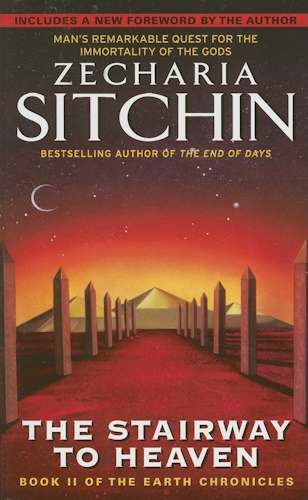

The Stairway to Heaven: Book II of the Earth Chronicles (The Earth Chronicles)

Since earliest times, human beings have pondered the incomprehensible questions of the universe, life . . . and the afterlife. Where did mortal man go to join the immortal Gods? Was the immense and complex structure at Giza an Egyptian Pharaoh's portal to immortality? Or a pulsating beacon built by extraterrestrials for landing on Earth?
In this second volume of his trailblazing series The Earth Chronicles, Zecharia Sitchin unveils secrets of the pyramids and hidden clues from ancient times to reveal a grand forgery on which established Egyptology is founded, and takes the reader to the Spaceport and Landing Place of the Anunnaki gods—"Those Who from Heaven to Earth Came."
About the Author
Zecharia Sitchin is an internationally acclaimed author and researcher whose books offer evidence that we are not alone in our own solar system. One of a handful of scholars able to read the Sumerian cuneiform tablets, he has combined archaeology, ancient texts, and the Bible with the latest scientific discoveries to retell the history and prehistory of mankind and planet Earth. His trailblazing books have been translated into more than twenty languages; his first one, an oft-quoted classic, celebrates the thirtieth anniversary of its publication. A graduate of the University of London and a journalist and editor in Israel for many years, he now lives and writes in New York.
Paperback: 464 pages
Series: Earth Chronicles (Book 2)
Publisher: Harper; Reprint edition (March 27, 2007)
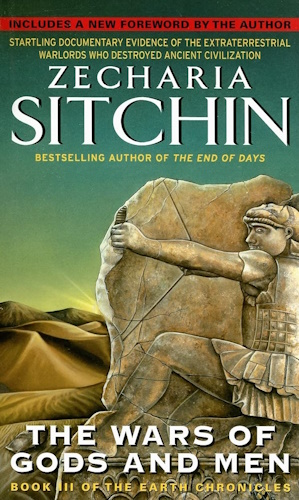

The Wars of Gods and Men (Earth Chronicles)

Thousands of years ago, the Earth was a battlefield. These were the wars that would shape man's destiny—terrible conflicts that began lifetimes earlier on another planet.
Parting the mists of time and myth, the internationally renowned scholar Zecharia Sitchin takes us back in this volume to the violent beginnings of the human story, when gods—not men—ruled the Earth.
In a spellbinding reconstruction of epic events preserved in legends and ancient writings, he traces the conflicts that began on another world, continued on Earth, and culminated in the use of nuclear weapons—an event recorded in the Bible as the upheaval of Sodom and Gomorrah.
About the Author
Zecharia Sitchin is an internationally acclaimed author and researcher whose books offer evidence that we are not alone in our own solar system. One of a handful of scholars able to read the Sumerian cuneiform tablets, he has combined archaeology, ancient texts, and the Bible with the latest scientific discoveries to retell the history and prehistory of mankind and planet Earth. His trailblazing books have been translated into more than twenty languages; his first one, an oft-quoted classic, celebrates the thirtieth anniversary of its publication. A graduate of the University of London and a journalist and editor in Israel for many years, he now lives and writes in New York.
Paperback: 377 pages
Series: Earth Chronicles (Book 3)
Publisher: Harper (March 27, 2007)
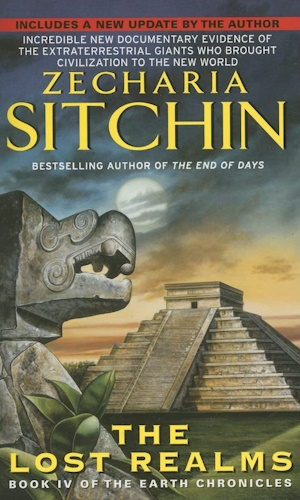

The lost realms: Book IV of the Earth Chronicles (The Earth Chronicles)

In the sixteenth century, Spanish conquerors came to the New World in search of El Dorado, the fabled city of gold. Instead, they encountered inexplicable phenomena that have puzzled scholars and historians ever since: massive stone edifices constructed in the Earth's most inaccessible regions . . . great monuments forged with impossible skill and unknown tools . . . intricate carvings describing events and places half a world away.
Who were the bearded "gods of the golden wand" who had brought civilization to the Americas millennia before Columbus? Who were the giants whose sculpted stone heads in Mesoamerica still mystify to this day?
In this remarkably researched fourth volume of The Earth Chronicles, author and explorer Zecharia Sitchin uncovers the long-hidden secrets of the lost New World civilizations of the Olmecs, Aztecs, Mayas and Incas, and links the conquistadors' quest for El Dorado to the extraterrestrials who searched there for gold long before.
About the Author
Zecharia Sitchin is an internationally acclaimed author and researcher whose books offer evidence that we are not alone in our own solar system. One of a handful of scholars able to read the Sumerian cuneiform tablets, he has combined archaeology, ancient texts, and the Bible with the latest scientific discoveries to retell the history and prehistory of mankind and planet Earth. His trailblazing books have been translated into more than twenty languages; his first one, an oft-quoted classic, celebrates the thirtieth anniversary of its publication. A graduate of the University of London and a journalist and editor in Israel for many years, he now lives and writes in New York.
Paperback: 320 pages
Series: Earth Chronicles (Book 4)
Publisher: Harper; Earth Chronicles edition (March 27, 2007)
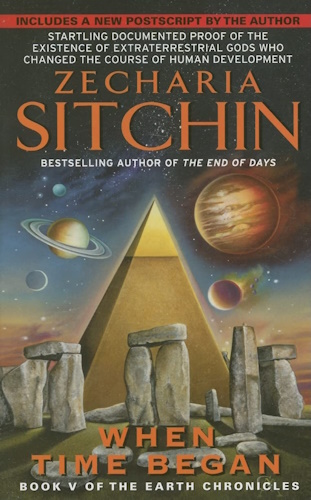

When Time Began: Book V of the Earth Chronicles (The Earth Chronicles)

They came to Earth thousands of years ago to usher in mankind's first New Age of scientific growth and spiritual enlightenment. Under the guidance of these ancient visitors from the heavens, human civilisation flourished - as revolutionary advances in art, science and thought swept through the inhabited world. And they left behind magnificent monuments -- baffling monoliths and awesome, towering structures that stand to this day as testaments to their greatness.
In this extraordinarily documented, meticulously researched work, Zecharia Sitchin draws remarkable correlations between the events that shape our civilisation in millennia past - pinpointing with astonishing accuracy the tumultuous beginning of time as we know it . . . and revealing to us the indisputable signature of extraterrestrial god indelibly written in stone.
About the Author
Zecharia Sitchin is an internationally acclaimed author and researcher whose books offer evidence that we are not alone in our own solar system. One of a handful of scholars able to read the Sumerian cuneiform tablets, he has combined archaeology, ancient texts, and the Bible with the latest scientific discoveries to retell the history and prehistory of mankind and planet Earth. His trailblazing books have been translated into more than twenty languages; his first one, an oft-quoted classic, celebrates the thirtieth anniversary of its publication. A graduate of the University of London and a journalist and editor in Israel for many years, he now lives and writes in New York.
Paperback: 432 pages
Series: Earth Chronicles (Book 5)
Publisher: Harper (March 27, 2007)
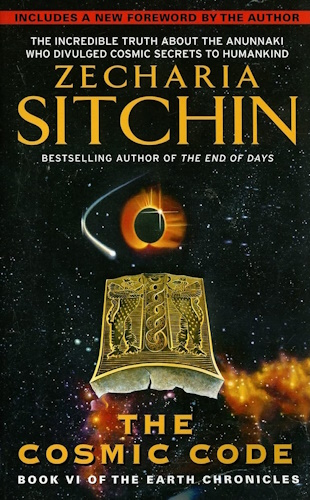

The Cosmic Code: Book VI of the Earth Chronicles

Many thousands of years ago, a group of extraterrestrials from another planet guided the evolution of life on Earth—determining the existence and nature of humankind as we know it today. How did the master builders from the stars construct the miracle called man? Is the DNA that is at the core of all life in the universe a "cosmic code" that links Earth to heaven and man to God?
In this sixth volume of The Earth Chronicles, Zecharia Sitchin unveils writings from the past to decipher prophesies, and reveals how the DNA-matched Hebrew alphabet and the numerical values of its letters serve as a code that bares the secrets of mortal man’s fate and mankind’s celestial destiny.
About the Author
Zecharia Sitchin is an internationally acclaimed author and researcher whose books offer evidence that we are not alone in our own solar system. One of a handful of scholars able to read the Sumerian cuneiform tablets, he has combined archaeology, ancient texts, and the Bible with the latest scientific discoveries to retell the history and prehistory of mankind and planet Earth. His trailblazing books have been translated into more than twenty languages; his first one, an oft-quoted classic, celebrates the thirtieth anniversary of its publication. A graduate of the University of London and a journalist and editor in Israel for many years, he now lives and writes in New York.
Paperback: 320 pages
Series: Earth Chronicles (Book 6)
Publisher: Harper; 2/25/07 edition (March 27, 2007)
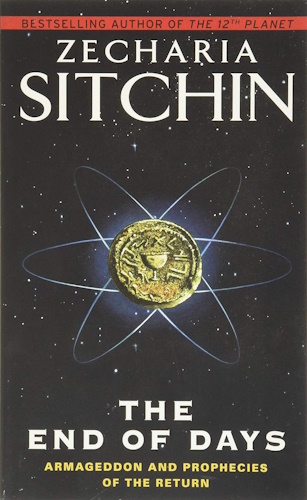

The End of Days: Armageddon and Prophecies of the Return (Earth Chronicles)

Why is it that our current twenty-first century A.D. is so similar to the twenty-first century B.C.?
Is history destined to repeat itself?Will biblical prophecies come true, and if so, when?
It has been more than three decades since Zecharia Sitchin's trailblazing book The 12th Planet brought to life the Sumerian civilization and its record of the Anunnaki—the extraterrestrials who fashioned man and gave mankind civilization and religion. In this new volume, Sitchin shows that the End is anchored in the events of the Beginning, and once you learn of this Beginning, it is possible to foretell the Future.
In The End of Days, a masterwork that required thirty years of additional research, Sitchin presents compelling new evidence that the Past is the Future—that mankind and its planet Earth are subject to a predetermined cyclical Celestial Time.
In an age when religious fanaticism and a clash of civilizations raise the specter of a nuclear Armageddon, Zecharia Sitchin shatters perceptions and uses history to reveal what is to come at The End of Days.
About the Author
Zecharia Sitchin is an internationally acclaimed author and researcher whose books offer evidence that we are not alone in our own solar system. One of a handful of scholars able to read the Sumerian cuneiform tablets, he has combined archaeology, ancient texts, and the Bible with the latest scientific discoveries to retell the history and prehistory of mankind and planet Earth. His trailblazing books have been translated into more than twenty languages; his first one, an oft-quoted classic, celebrates the thirtieth anniversary of its publication. A graduate of the University of London and a journalist and editor in Israel for many years, he now lives and writes in New York.
Paperback: 320 pages
Series: Earth Chronicles (Book 7)
Publisher: Harper (March 25, 2008)
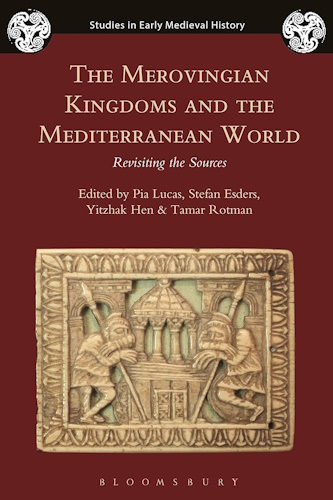

The Merovingian Kingdoms and the Mediterranean World: Revisiting the Sources (Studies in Early Medieval History)

This book explores the Merovingian kingdoms in Gaul within a broader Mediterranean context. Their politics and culture have mostly been interpreted in the past through a narrow local perspective, but as the papers in this volume clearly demonstrate, the Merovingian kingdoms had complicated and multi-layered political, religious, and socio-cultural relations with their Mediterranean counterparts, from Visigothic Spain in the West to the Byzantine Empire in the East, and from Anglo-Saxon England in the North to North-Africa in the South.
The papers collected here provide new insights into the history of the Merovingian kingdoms by examining various relevant issues, ranging from identity formation to the shape and rules of diplomatic relations, cultural transformation, as well as voiced attitudes towards the “other”. Each of the papers begins with a short excerpt from a primary source, which serves as a stimulus for the discussion of broader issues. The various sources' point of view and their contextualization stand at the heart of the analysis, thus ensuring that discussions are accessible to students and non-specialists, without jeopardizing the high academic standard of the debate.
About the Author
Stefan Esders is Professor of History of Late Antiquity and the Early Middle Ages at the Friedrich-Meinecke-Institut, Freie Universität Berlin, Germany.
Yitzhak Hen is Professor of Late Antique and Early Medieval History, Department of History at The Hebrew University of Jerusalem and the Director of the Israel Institute for Advanced Studies, Israel.
Pia Lucas is a doctoral candidate and research assistant at the Friedrich-Meinecke-Institut, Freie Universität Berlin, Germany.
Tamar Rotman is a post-doctoral fellow in the Department of General History at Bar Ilan University and a research assistant in the Israeli Science Foundation project “Through distant eyes: the birth of a Merovingian story, 575-1575”, Israel.
Series: Studies in Early Medieval History
Hardcover: 280 pages
Publisher: Bloomsbury Academic (May 2, 2019)
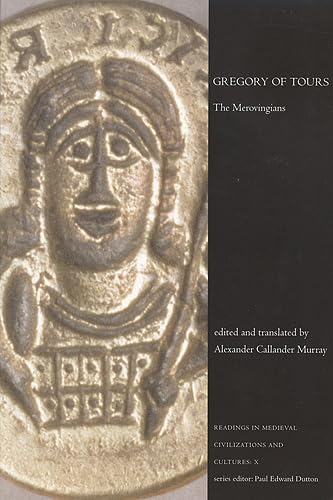

Gregory of Tours: The Merovingians (Readings in Medieval Civilizations and Cultures)

Georgius Florentius Gregorius, better known to posterity as Gregory, Bishop of Tours, was born about 538 to a highly distinguished Gallo-Roman family in Clermont in the region of Auvergne. Best known for his 10-book Histories (often called the History of the Franks), Gregory left us detailed accounts of his own times as well as those of the early Merovingian kings, known as the "long-haired kings," who united the Franks and took control of most of Gaul in the late fifth and early sixth century. Although he is one of the most important historians of pre-modern times, the complex, apparently disconnected, elements of Gregory's work are often difficult for today's readers to understand. This selected, new translation is composed of extensive sections from Books II to X and follows in a connected narrative the political events of the Histories from the appearance of the first Merovingian kings, Merovech, Childeric, and Clovis to the last years of the reigns of Guntram and Childebert II in the late sixth century. This book is designed to introduce new readers, and even experienced ones, to the political world (secular and ecclesiastical) of sixth-century Gaul and to provide an up-to-date guide to reading the bishop of Tours' fascinating account of his times.
Included in this volume are twenty-one drawings by Jean-Paul Laurens, a nineteenth-century French historical artist and interpreter of the Merovingians.
About the Author
Alexander Callander Murray is a member of the Department of History and Centre for Medieval Studies, University of Toronto, where he teaches at the Erindale Campus. He is author of Germanic Kinship Structure: Studies in Law and Society in Antiquity and the Early Middle Ages (1983), editor of After Rome's Fall: Narrators and Sources of Early Medieval History (1998), and has written articles on Merovingian administration and office-holding, and on the dating of Beowulf.
Series: Readings in Medieval Civilizations and Cultures (Book 10)
Paperback: 288 pages
Publisher: University of Toronto Press, Higher Education Division; 1 edition (December 1, 2005)
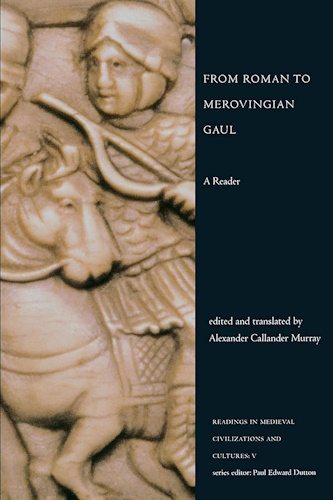

From Roman to Merovingian Gaul: A Reader (Readings in Medieval Civilizations and Cultures)

This admirable collection of primary sources is so copious that it will prove instructive to senior professors as well as beginning undergraduates. The amazingly wide choice of readings, introduced by brief, astute, unpretentious comments, lays out before us the astonishing spectrum of writings documenting what is still often, but wrongly, called the 'Dark Ages.' The collection is unusually homogeneous: the editor who selected the contents also translated almost all of them from the original latin. The translations read well and are rendered exceptionally accurate by Professor Murray's deep learning in late Roman and Frankish institutions. Nowhere in the western part of the Roman Empire was continuity from classical antiquity to the Middle Ages so sustained and observable as in Gaul. The connection between the Roman and Merovingian periods was not seamless, but close to being so. The sources gathered and presented by Alexander C. Murray provide an engrossing, inspiring, and readable record of a decisive historical period. (Walter Goffart, University of Toronto)
About the Author
Alexander Callander Murray is a member of the Department of History and Centre for Medieval Studies, University of Toronto, where he teaches at the Erindale Campus. He is author of Germanic Kinship Structure: Studies in Law and Society in Antiquity and the Early Middle Ages (1983), editor of After Rome's Fall: Narrators and Sources of Early Medieval History (1998), and has written articles on Merovingian administration and office-holding, and on the dating of Beowulf.
Series: Readings in Medieval Civilizations and Cultures (Book 5)
Paperback: 696 pages
Publisher: University of Toronto Press, Higher Education Division; 1 edition (August 1, 1999)
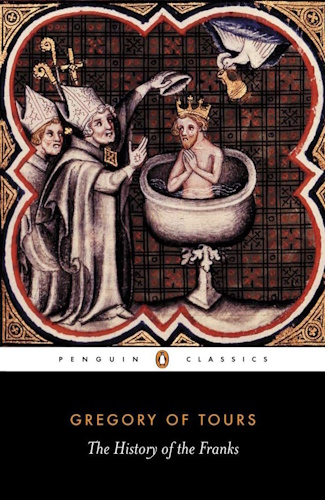

A History of the Franks (Penguin Classics)

Written in the 6th century by the Bishop of Tours, "Historia Francorum" is a ten volume work that recounts the world's history from creation, focusing on the movement of Christianity into Gaul. From the life of Saint Martin of Tours to the conversion of the Franks and the conquest of Clovis, "Historia" also details the procession of Frankish kings down to Gregory's own time. The later books grow more personal, ultimately reflecting the author's arrest from a misplaced charge of treason. Though written largely as a fight against heresy, "Historia" is widely considered a dramatic narrative of French history. Detailed and engaging, this historical document is also a skillful unraveling of many years of transition from the Roman period to Medieval period, reflective of the little-known flowering of historical recovery in the 'Dark Ages.'
About the Author
Gregory of Tours (538-94), French historian, bishop of Tours (from 573), was born in Clermont-Ferrand. He had a distinguished and successful career as bishop. Gregory wrote accounts of miracles of the saints, an astronomical work to determine movable feasts, and a commentary on the Psalms. His masterpiece, Historia Francorum [history of the Franks], in 10 books, is a universal history; its account of contemporary events is of great importance.
Series: Penguin Classics
Paperback: 720 pages
Publisher: Penguin Classics; Reprint edition (February 28, 1976)
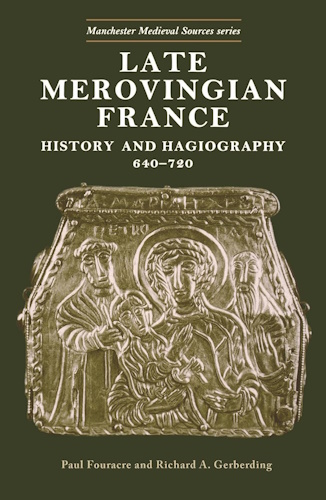

Late Merovingian France (Manchester Medieval Sources MUP)

This collection of documents in translation brings together the seminal sources for the late Merovingian Frankish kingdom. It inteprets the chronicles and saint's lives rigorously to reveal new insights into the nature and significance of sanctity, power and power relationships. The book makes available a range of 7th- and early 8th-century texts, five of which have never before been translated into English. It opens with a broad-ranging explanation of the historical background to the translated texts and then each source is accompanied by a full commentary and an introductory essay exploring its authorship, language and subject matter. The sources are rich in the detail of Merovingian political life. Their subjects are the powerful in society and they reveal the successful interplay between power and sanctity, a process which came to underpin much of European culture throughout the early Middle Ages.
About the Author
Paul Fouracre is Professor of Medieval History at the University of Manchester.
Series: Manchester Medieval Sources MUP (Book 1)
Paperback: 397 pages
Publisher: Manchester University Press; 1 edition (March 14, 1996)
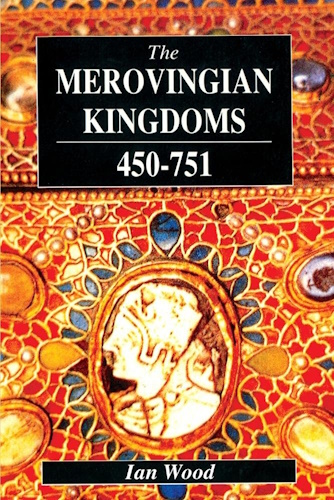

The Merovingian Kingdoms 450-751

A comprehensive survey which begins with the rise of the Franks, then examines the Merovingians.
'xxx; the most detailed account of the Merovingian kingdoms available in any language, and the most exciting xxx; this book should be required reading for anyone interested in the early Middle Ages, whether archaeologist or historian.' British Archaeological News
Paperback: 408 pages
Publisher: Routledge; 1 edition (December 1, 1993)
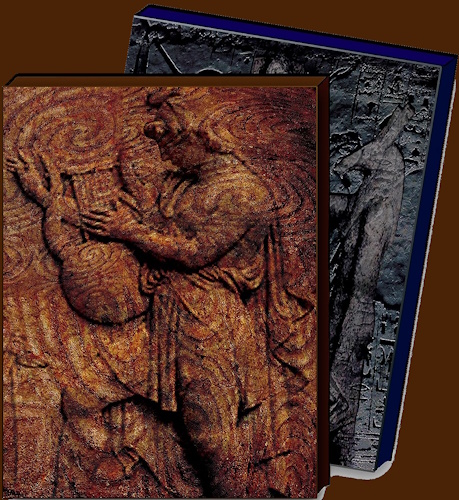
The Irish Origins of Civilization, Volume One: The Servants of Truth: Druidic Traditions & Influence Explored
The follow up to the acclaimed book Atlantis, Alien Visitation, and Genetic Manipulation, Michael Tsarion’s The Irish Origins of Civilization concentrates on the fate of the world after the fall of Atlantis and birth of evil.
In the tradition of Zecharia Sitchin and Immanuel Velikovsky, Michael’s investigations reveal the reason for the eradication of the Druids and highlight for the first time the terrible campaign of genocide against the ancient Irish elders whose knowledge once enriched world culture. Michael exposes the true origins of the world’s premier secret societies and reveals the remarkable mysteries they have been sworn to guard by sword and deception. He shows that the elements of civilization - megalithic construction, writing, music, astronomy, astrology, medicine, farming, navigation, and most importantly the principles of religion, originated in Britain, Ireland and Scandinavia.
Every European needs to read this book to find out how the history of "Anglo-Saxon" man has been misrepresented and perverted. Michael explains the true meaning of the word Aryan and shows that it was the original name of Ireland. He explains the reason why so many tribes speak of the coming of the fair gods, the men of wisdom. He explains the connections between the Irish Druids and Egyptian Amenists and the ruin Akhenaton's Luciferian cult brought to Egypt and the world. As Michael wrote...
"What does it mean to live in the age of revealing? It means the light that royals and secret societies claim to adore is finally being shone brightly upon their own orders and ideologies. It means the Sun of Truth has finally risen to expose their once hidden machinery of tyranny and control…
…The auction of a whole civilization - the finest known - and the extermination of the Druids are two of many subjects brought to the limelight in these volumes. It is for this reason this author first chose - in Atlantis, Alien Visitation and Genetic Manipulation - to deal with Atlantis and Lemuria, since it was from there the story of the ancestors of Gaels and Celts begins. If we are to seek out the origins of Arthurian legends and Welsh, Irish and Scottish myths, it is to lost Atlantis and Lemuria we are to look. And if we are to seek reasons why the true story of these places and peoples has not been revealed, we begin with the powers that dominate and rule mankind from behind the obvious thrones of religion and politics. These ruthless agencies have their origins in the ancient past, and are biological or ideological descendants of the sorcerers of Atlantis…
…For those hot on the trail of the world’s premier secret societies, this book will be an invaluable source of revelation. It alone reveals the intelligence behind Royalty, Masonry and Judeo-Christianity.”
Paperback: 531 pages
Publisher: Unslaved Media (February 27, 2012)
![]()
![]()